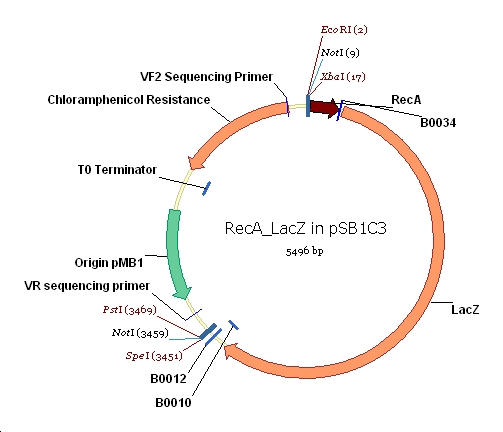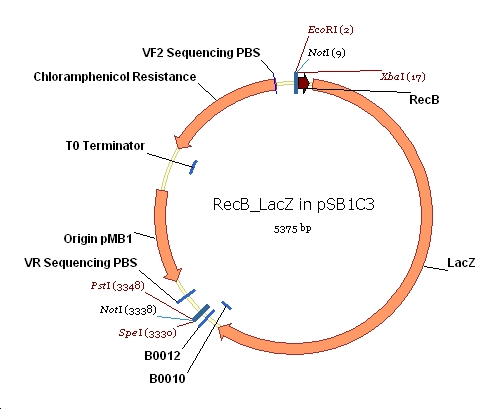Team:Heidelberg LSL/Project UVsensors
From 2012hs.igem.org
| Line 58: | Line 58: | ||
<h4>Description</h4> | <h4>Description</h4> | ||
| - | <p>It was intended to generate constructs that are able to sense irradiation and respond to UV light with a colorful output. </p> | + | <p>It was intended to generate constructs that are able to sense irradiation and respond to UV light with a colorful output. For details of the cloning procedure, please refer to our <a href="https://2012hs.igem.org/Team:Heidelberg_LSL/Notebook">notebook</a>.</p> |
<p>First, we looked for proper <i>E. coli</i> promoters known to be involved in the SOS response. While RecB, RecC and SulA promoters were generated with custom-made oligonucleotides, we took precA as biobrick <a href="http://partsregistry.org/Part:BBa_J22106">BBa_J22106</a>. We designed the oligos for precB, precC and psulA to contain <a href="http://dspace.mit.edu/handle/1721.1/45139"> BB-2</a> standard prefix and suffix and putative promoter sequences (approx. 50 bp upstream of the start codon of each gene) taken from the <a href="http://ecoliwiki.net/Main_Page">EcoliWiki</a>. Oligos were annealed and then directly used for ligation since they already contained the required overhangs. The precA part was therefore digested with EcoRI and SpeI. | <p>First, we looked for proper <i>E. coli</i> promoters known to be involved in the SOS response. While RecB, RecC and SulA promoters were generated with custom-made oligonucleotides, we took precA as biobrick <a href="http://partsregistry.org/Part:BBa_J22106">BBa_J22106</a>. We designed the oligos for precB, precC and psulA to contain <a href="http://dspace.mit.edu/handle/1721.1/45139"> BB-2</a> standard prefix and suffix and putative promoter sequences (approx. 50 bp upstream of the start codon of each gene) taken from the <a href="http://ecoliwiki.net/Main_Page">EcoliWiki</a>. Oligos were annealed and then directly used for ligation since they already contained the required overhangs. The precA part was therefore digested with EcoRI and SpeI. | ||
| Line 171: | Line 171: | ||
</html> | </html> | ||
/div> | /div> | ||
| + | /p> | ||
Revision as of 22:57, 16 June 2012
Strategy
Sensor Construction

Description
It was intended to generate constructs that are able to sense irradiation and respond to UV light with a colorful output. For details of the cloning procedure, please refer to our notebook.
First, we looked for proper E. coli promoters known to be involved in the SOS response. While RecB, RecC and SulA promoters were generated with custom-made oligonucleotides, we took precA as biobrick BBa_J22106. We designed the oligos for precB, precC and psulA to contain BB-2 standard prefix and suffix and putative promoter sequences (approx. 50 bp upstream of the start codon of each gene) taken from the EcoliWiki. Oligos were annealed and then directly used for ligation since they already contained the required overhangs. The precA part was therefore digested with EcoRI and SpeI.
As reporters, we decided for GFP and LacZ from the biobricks BBa_E0240 and BBa_K173004, respectively. We digested those plasmids with XbaI and PStI to allow for ligation with promoters into backbone pSB1K3 via standard assembly.
Finally, constructs were transformed into E. coli strain BL21 and applied to sense UV radiation with visible output.
Prior to submission, parts were transferred into pSB1C3.
Details
The following constructs were created by the above explained strategy.
| Number | Promoter | Reporter | Backbone |
| 01 | precA | gfp | pSB1K3 |
| 02 | psulA | gfp | pSB1K3 |
| 03 | precA | lacZ | pSB1K3 |
| 04 | precB | lacZ | pSB1K3 |
| 05 | precC | lacZ | pSB1K3 |
| 06 | SulA | lacZ | pSB1K3 |
| 07 | precA | lacZ | pSB1C3 | 08 | precB | lacZ | pSB1C3 | 09 | psulA | lacZ | pSB1C3 |
Sensor constructs
Those constructs were submitted as parts.

 "
"

